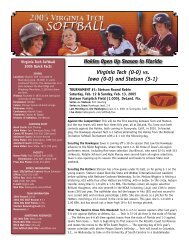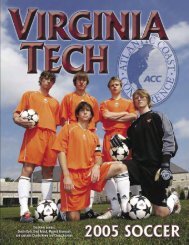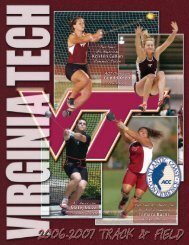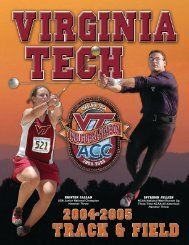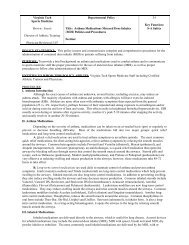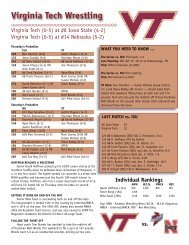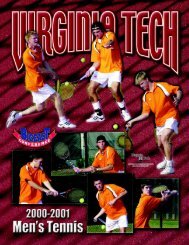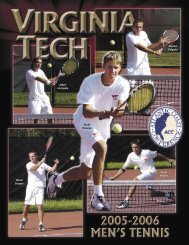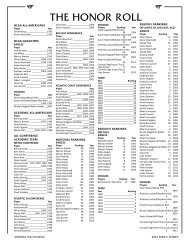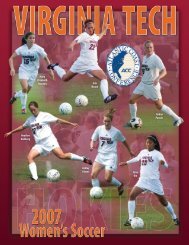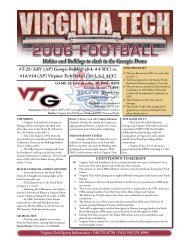Deron Washington AD Vassallo Coach Seth Greenberg - HokieSports
Deron Washington AD Vassallo Coach Seth Greenberg - HokieSports
Deron Washington AD Vassallo Coach Seth Greenberg - HokieSports
Create successful ePaper yourself
Turn your PDF publications into a flip-book with our unique Google optimized e-Paper software.
DR. CHARLES STEGER<br />
UNIVERSITY PRESIDENT<br />
Now in his eighth year as President of<br />
Virginia Tech, Dr. Charles Steger has charted<br />
a course to bolster the university’s research<br />
enterprise and compete among the nation’s<br />
premier research institutions. Under his<br />
direction, the university has adopted a<br />
strategic plan, which is guiding the growth<br />
of the research enterprise, fostering outreach<br />
initiatives, and increasing quality across all<br />
aspects of the academic community.<br />
Earlier this year, the tranquil learning<br />
environment of Virginia Tech was suddenly<br />
shattered by an outburst of incomprehensible<br />
violence that left more than 50 students and<br />
faculty killed or injured. During this crisis,<br />
President Steger showed tremendous courage,<br />
compassion and leadership in bringing<br />
the university community together in the<br />
immediate aftermath of the tragedy and in the<br />
beginning stages of recovery. His leadership<br />
continues to draw praise from students, parents,<br />
alumni as well as from those with no direct<br />
connection with the university but who, from<br />
points around the world, witnessed the events.<br />
Also this year, Steger joined with Gov. Tim<br />
Kaine and Carilion Health Systems president Dr.<br />
Ed Murphy to announce the creation of a new<br />
medical school in Virginia. Virginia Tech and<br />
Carilion will create a jointly-operated private<br />
medical school, located in downtown Roanoke,<br />
adjacent to Carilion Roanoke Memorial Hospital.<br />
Gov. Kaine said it was an “important initiative<br />
to help meet the health workforce and medical<br />
research needs of our state, as well as to<br />
strengthen the economy of the region.”<br />
In the minds of many, Steger will best<br />
be remembered for making the impossible<br />
a reality. He will be forever credited with<br />
negotiating Virginia Tech’s entrance into the<br />
Atlantic Coast Conference — a 50-year dreamcome-true<br />
for Hokie fans.<br />
Another of the most memorable<br />
contributions of Steger’s administration was his<br />
role in the Higher Education Restructuring Act,<br />
which took effect in July, 2006. Steger was one<br />
of the leaders among university presidents to<br />
help define a ground-breaking new relationship<br />
between the Commonwealth of Virginia and<br />
its colleges and universities, which enables<br />
greater institutional flexibility and potential for<br />
growth. This legislation allows Virginia Tech to<br />
perform long-range planning, ensure a stable<br />
and predictable revenue stream, and ultimately<br />
ensure a quality education for its students.<br />
A hallmark of Steger’s administration is his<br />
commitment to the students. With Steger’s<br />
leadership, the university has reaffirmed its<br />
core mission of undergraduate education. The<br />
university is dedicated to fostering a researchintensive<br />
environment that offers students<br />
an opportunity to learn the scientific process<br />
while enhancing their critical-thinking skills.<br />
Recognizing that students, upon<br />
graduation, will be entering a global economy,<br />
Virginia Tech initiated a comprehensive<br />
International Strategic Plan and has doubled<br />
the number of students participating in<br />
international education opportunities.<br />
Research activity continues to steadily<br />
increase, and the focus of the research<br />
enterprise continues to widen. Shortly after<br />
Steger took office, the university launched<br />
the Virginia Bioinformatics Institute, which in<br />
seven years has already secured well over $50<br />
million in external research funding. Virginia<br />
Tech has also partnered with a number of<br />
other universities to further leverage its<br />
research strengths and resources, including<br />
Johns Hopkins University, Wake Forest<br />
University, University of Virginia, University of<br />
Maryland and Georgetown University.<br />
Concurrent with the expanding research<br />
agenda, the university has expanded its<br />
outreach efforts like never before. For example,<br />
Virginia Tech has partnered in numerous<br />
initiatives in Southern Virginia, including the<br />
renowned Institute for Advanced Learning<br />
and Research (IALR), which are advancing<br />
both educational and economic development<br />
opportunities.<br />
Virginia Tech remains one of the most<br />
competitive institutions in the state.<br />
The university received a record 19,579<br />
applications for the class entering in the fall<br />
of 2007. Students offered admission raised<br />
the academic bar with an average math and<br />
critical reading SAT score of 1229 and an<br />
average high school GPA of 3.82. The 2007<br />
application pool also was more diverse by<br />
gender and race, with greater numbers<br />
of Asian, African-American and Hispanic-<br />
American students. The university also has<br />
established the Virginia Tech Principles of<br />
Community, which affirm the university’s<br />
commitment to civility and respect for all<br />
people.<br />
In his previous role as Vice President for<br />
Development and University Relations, Steger<br />
built a critical base of private support when<br />
he led the Campaign for Virginia Tech, which<br />
raised more than $337 million. Today, private<br />
support from Virginia Tech’s alumni and friends<br />
continues to play an essential role in this<br />
university community. Last year, the university<br />
raised more than $67 million, a 23.5 percent<br />
increase over the previous year.<br />
Steger’s ties to Virginia Tech span five<br />
decades as a student, professor, dean, vice<br />
president and now president. While on the<br />
faculty, he twice won teaching excellence<br />
awards. When he became dean of the College<br />
of Architecture and Urban Studies in 1981, he<br />
was, at age 33, the youngest architecture dean<br />
in the nation. His most recent publications<br />
include book chapters on the topics of the<br />
business of education and the university<br />
presidency.<br />
Steger is past-Chairman of the Virginia<br />
Council of Presidents and is currently chair<br />
of the Virginia Space Grant Consortium.<br />
He is a member of the National Council<br />
on Competitiveness and the Association<br />
of Governing Boards of Universities and<br />
Colleges. For his significant contributions<br />
to the mission of The National Conference<br />
for Community and Justice, he received the<br />
NCCJ Humanitarian Award in 2002. The New<br />
Century Technology Council awarded him its<br />
2004 Compass Award for visionary thinking<br />
and leadership in the field of information<br />
technology.<br />
Steger also serves on the boards of<br />
several organizations including the Carilion<br />
Biomedical Institute, the Council of Higher<br />
Education’s General and Professional Advisory<br />
Committee, the Virginia Business Higher<br />
Education Council, the World Institute for<br />
Disaster Risk Management, and the Roanoke<br />
Economic Development Partnership. He<br />
has been appointed by four Governors of<br />
Virginia to serve on various boards, study<br />
commissions and work groups including,<br />
the Steering Committee of the Governor’s<br />
Higher Education Summit, Virginia Institute<br />
for Defense and Homeland Security, Secure<br />
Virginia Initiative, and the Board of Directors<br />
of the Innovative Technology Authority.<br />
He is a Fellow in the American Institute<br />
of Architects, and holds the William C.<br />
Noland Award for distinguished service and<br />
accomplishments from the Virginia Society<br />
of the AIA. The First Virginia Chapter of the<br />
National Society of Fundraising Executives<br />
recognized him as the Outstanding<br />
Fundraising Executive in 1999.<br />
Steger received his bachelor of<br />
architecture degree, master of architecture<br />
degree and Ph.D., in environmental science<br />
and engineering from Virginia Tech.<br />
2 0 0 7 - 2 0 0 8 V I R G I N I A T E C H M E N’ S B A S K E T B A L L<br />
UNIVERSITY PRESIDENT CHARLES STEGER<br />
167






